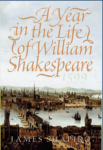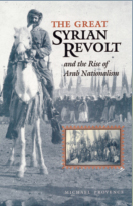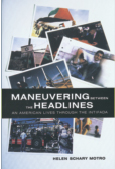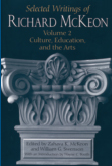|
||
      |
Peer Review ::
On the shelf
 A
Year in the Life of William Shakespeare, by James Shapiro, AM’78,
PhD’82, Harper Collins Publishers, 2005. Fraught with strife, loneliness,
and uncertainty, 1599 was a turbulent year for the immortal Bard. England
was bickering with its neighbors, aging Queen Elizabeth was without an heir,
and the British Empire was on the rise, along with the Globe Theatre. Supervising
the theater’s construction, Shakespeare was away from home and family.
Shapiro mixes biography and history with literary criticism to analyze the
ideas and events that informed Shakespeare’s thought and work during
a prolific year: 1599 saw the sketching out of Hamlet, the writing
of Julius Caesar and As You Like It, and the completion
of Henry V.
A
Year in the Life of William Shakespeare, by James Shapiro, AM’78,
PhD’82, Harper Collins Publishers, 2005. Fraught with strife, loneliness,
and uncertainty, 1599 was a turbulent year for the immortal Bard. England
was bickering with its neighbors, aging Queen Elizabeth was without an heir,
and the British Empire was on the rise, along with the Globe Theatre. Supervising
the theater’s construction, Shakespeare was away from home and family.
Shapiro mixes biography and history with literary criticism to analyze the
ideas and events that informed Shakespeare’s thought and work during
a prolific year: 1599 saw the sketching out of Hamlet, the writing
of Julius Caesar and As You Like It, and the completion
of Henry V.
The After Death Room, by Michael McColly, AM’85, Soft Skull Press, 2005. Testing positive for HIV made a yoga devotee (and instructor) out of the author, a Northwestern University English professor who found strength and solace in the ancient discipline. After leading a yoga workshop for HIV/AIDS sufferers in South Africa, McColly embarked on a global odyssey to understand how cultural attitudes affect those with the disease. His memoir chronicles black preachers on Chicago’s South Side, Buddhist monks in a remote Thai monastery, male sex workers in urban India, and mullahs in Islamic Senegal.
Healthy, Wealthy, & Fair: Health Care and the Good Society, edited by James A. Morone, AM’76, PhD’82, and Lawrence R. Jacobs, Oxford University Press, 2005. American affluence notwithstanding, United States citizens endure lower life expectancies, greater infant mortality, and higher adolescent death rates than citizens of most other industrialized nations—and even of some developing countries. Calling for a rebellion against the social, political, and economic forces that divide the healthy from the ailing, this collection of articles by health-policy experts offers suggestions for reform.
 The
Great Syrian Revolt and the Rise of Arab Nationalism, by Michael
Provence, AM’97, PhD’01, University of Texas Press, 2005. Fed
up with colonial rule and the native elite that supported it, a mass movement
of Syrian peasants, workers, and army veterans rose up in 1925. Although
they failed to kick the French out of Syria, the rebels established a model
of popular nationalism, a language, and set of tactics adopted by every
Arab people’s rebellion since. Using colonial intelligence, neglected
memoirs, and popular memory, Provence demonstrates how the Great Syrian
Revolt helped shape the modern Middle East.
The
Great Syrian Revolt and the Rise of Arab Nationalism, by Michael
Provence, AM’97, PhD’01, University of Texas Press, 2005. Fed
up with colonial rule and the native elite that supported it, a mass movement
of Syrian peasants, workers, and army veterans rose up in 1925. Although
they failed to kick the French out of Syria, the rebels established a model
of popular nationalism, a language, and set of tactics adopted by every
Arab people’s rebellion since. Using colonial intelligence, neglected
memoirs, and popular memory, Provence demonstrates how the Great Syrian
Revolt helped shape the modern Middle East.
War and the Engineers: The Primacy of Politics over Technology, by Keir A. Lieber, AM’96, PhD’00, Cornell University Press, 2005. Conventional wisdom—and formal academic theory—insists that new technologies play a part in provoking or preventing war. Lieber, a political-science professor and faculty fellow at both the Joan B. Kroc Institute for International Peace Studies and the Nanovic Institute for European Studies at the University of Notre Dame, sets out to test the old axiom. His conclusion? Technology is neither here nor there; power politics remains the mightiest motivator.
 Fire
Sale, by Sara Paretsky, AM’69, MBA’77, PhD’77,
G. P. Putnam’s Sons, 2005. The latest installment of the mystery series
returns detective V. I. Warshawski to her South Side Chicago roots. Filling
in as a girls’ basketball coach at her old high school, Paretsky’s
heroine finds herself confronted with a run-down gym, a team of gangbangers
and teenage moms, and—of course—a wicked murderer. The excitement
heats up when a local factory explodes and the 19-year-old son of a discount-store
tycoon disappears.
Fire
Sale, by Sara Paretsky, AM’69, MBA’77, PhD’77,
G. P. Putnam’s Sons, 2005. The latest installment of the mystery series
returns detective V. I. Warshawski to her South Side Chicago roots. Filling
in as a girls’ basketball coach at her old high school, Paretsky’s
heroine finds herself confronted with a run-down gym, a team of gangbangers
and teenage moms, and—of course—a wicked murderer. The excitement
heats up when a local factory explodes and the 19-year-old son of a discount-store
tycoon disappears.
Maneuvering Between the Headlines: An American Lives through the Intifada, by Helen Schary Motro, AB’70, Other Press, 2005. A Tel Aviv law professor and onetime idealist, Motro bears witness to the violence in Israel, which she recalls as a sequence of terrible jolts: her realization that the first child killed in the Intifada is the son of a Palestinian she has known for years, her own husband’s close call with a deadly bomb, the eroding safety of once-friendly neighborhoods. Motro’s personal account also explores the conflict’s ever-elusive peace and the effect of constant havoc on Israeli society.
 The
Public Life of Privacy in Nineteenth-Century American Literature,
by Stacey Margolis, AM’90, PhD’97, Duke University Press, 2005.
Desperation was hardly quiet for Americans 100-odd years ago, argues Margolis,
an English professor at the University of Utah. Challenging a long-held
notion of 19th-century culture as obsessed with privacy, she uses the writing
of Nathaniel Hawthorne, Henry James, Mark Twain, and others to show that
Americans depended on public life and social interaction—rather than
intentions, feelings, or desires—to help them understand themselves
and their world.
The
Public Life of Privacy in Nineteenth-Century American Literature,
by Stacey Margolis, AM’90, PhD’97, Duke University Press, 2005.
Desperation was hardly quiet for Americans 100-odd years ago, argues Margolis,
an English professor at the University of Utah. Challenging a long-held
notion of 19th-century culture as obsessed with privacy, she uses the writing
of Nathaniel Hawthorne, Henry James, Mark Twain, and others to show that
Americans depended on public life and social interaction—rather than
intentions, feelings, or desires—to help them understand themselves
and their world.
Selected Writings of Richard McKeon, Volume 2, edited by Zahava K. McKeon, PhD’74, and William G. Swenson, AB’63, PhD’74, University of Chicago Press, 2005. Inspiring fear, loathing, and fierce adoration in four decades of Chicago students, philosopher Richard McKeon was a fixture of the University and a fiery thinker and educator. At his death in 1985, he had authored 11 books and 158 articles covering a breathtaking range of topics and cultures. In this second volume of McKeon’s selected writings (Volume 1, published in 1998, was dedicated to the metaphysical and scientific), the longtime professor refashions grammar, rhetoric, and logic; explores mankind’s relation to the arts and humanities; and tackles the wooly problems of liberal-arts education.